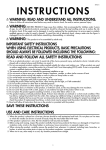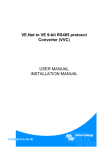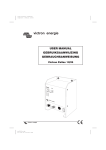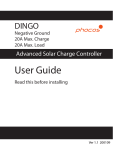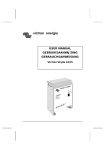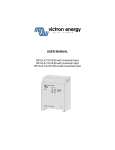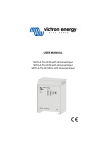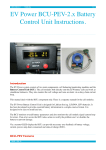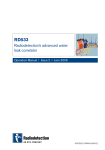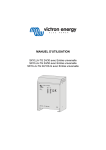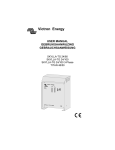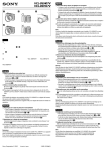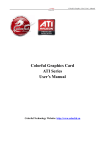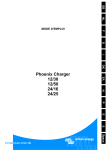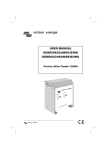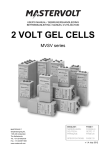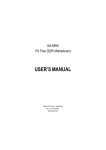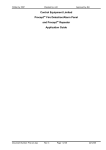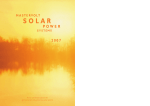Download Acrobat Distiller, Job 20
Transcript
USER MANUAL GEBRUIKSAANWIJZING GEBRAUCHSANWEISUNG SKYLLA 24/100 3-PHASE CE SECTIONS: ENGLISH NEDERLANDS DEUTSCH 2 17 37 Victron Energy BV De Paal 35 1351 JG Almere-Haven The Netherlands Article number Document number Version Date phone: ** 31 - (0) 36 - 535 9700 fax: ** 31 - (0) 36 - 531 1666 Subject to change without notice. * Wijzigingen onder voorbehoud. * victron energy manual Skylla 24/100 3F : ISM010022000 : ISM010022000 : 04 : 20 November 2001 Änderungen vorbehalten. Page 1 USER MANUAL ENGLISH 1. INTRODUCTION 3 2. DESCRIPTION 2.1 Maintenance 4 4 3. PROTECTION 3.1 Short circuit protection 3.2 Temperature protection 3.3 Input protection 5 5 5 5 4. COMPENSATED CHARGING 4.1 Temperature sensor 4.2 Voltage sensing 6 6 6 5. INSTALLATION 5.1 Connecting earth 5.2 Connecting mains 5.3 Connecting the battery 5.4 Connection procedure 7 7 7 7 8 6. START UP 6.1 Operating 6.2 Parallel use 6.3 Battery room ventilators 9 9 9 9 7. CALIBRATION 7.1 Adjusting the charging voltages 7.2 Changing the current limit level 7.3 Diode splitter 7.4 Factory settings 7.5 Jumpers and Potentiometers 10 10 11 11 11 11 8. FAULT FINDING 12 9. SPECIFICATIONS 9.1 Input 9.2 Output 9.3 General 15 15 15 15 10. Drawings 16 Page 2 user manual Skylla 24/100 3F victron energy 1. INTRODUCTION Victron Energy Victron Energy has established an international reputation as a leading designer and manufacturer of power systems. Our R&D department is the driving force behind this reputation. It is continually seeking new ways of incorporating the latest technology in our products. Each step forward results in value-adding technical and economical features. Our proven philosophy has resulted in a full range of state-of-the-art equipment for the supply of electrical power. All our equipment meets the most stringent requirements. Victron Energy systems provide you with high-quality AC supplies at places where there are no permanent sources of mains power. An automatic stand-alone power system can be created with a configuration comprising a Victron Energy inverter, battery charger, mains manager (if required) and, last but not least, batteries with sufficient capacity. Our equipment is suitable for countless situations in the field, on ships or other places where a mobile 230Vac power supply is indispensable. Victron Energy has the ideal power source for all kinds of electrical appliances used for household, technical and administrative purposes, including instruments susceptible to interference. All of these applications require a high-quality power supply in order to function properly. The Skylla battery charger 24/100, 3-phase This manual contains directions for installing the Skylla battery charger 24/100, 3-phase. It describes the functionality and operation of the Skylla battery charger, including its protective devices and other technical features. victron energy manual Skylla 24/100 3F Page 3 2. DESCRIPTION The Victron Skylla 24/100, 3-phase battery charger is subjected to full functional testing before leaving the factory. It is properly packed for secure transportation. The Skylla 24/100 3-phase charger is a rectifier/charger combination. The output is voltage controlled and the current is limited. The charger is protected against over-temperature and short circuit of any duration. It is housed in a IP20 specification aluminium case designed for wall or floor mounting. The mains input and battery output connections are made through the under side of the housing. The Skylla 24/100 3-phase charger is designed for a 24Vdc lead-acid battery system. The maximum charging current is 100A and the recommended battery capacity is 500 - 1000Ah. The charger is suitable for traction batteries. Please consult your local Victron Energy agent for more details.The Skylla 24/100 3-phase charger is a fully automatic battery charger. It is powered by 380Vac 50/60 Hz nominal mains supply. The input can be converted to 415Vac or to 440Vac. The charger is designed to be permanently connected to lead-acid batteries. It is no longer necessary to disconnect the charger during long term storage, for example during winter storage. Illustration 1. Schematic diagram of the Skylla 1. three phase input transformer; 2. half controlled thyristor bridge rectifier; 3. ripple suppression; 4. DC current shunt The Skylla will charge the battery as soon as the power switch is turned on, provided there is a mains supply. If automatic charge mode is selected (5% or 15 % charge mode, see the front panel), the battery will be charged with the built in IUoUo characteristic. The float voltage is factory pre-set to 26,5Vdc. The boost voltage is factory pre-set to 28,5Vdc. The boost and float voltages are user adjustable. The charger operates with two charge voltages, a high voltage (boost charge) and a low voltage (float charge). The charger switches automatically from boost charge to float charge after 1 or 4 hours (see illustration 2). The charger supplies a constant current to the battery, until the pre-set boost charge voltage is reached (28.5Vdc). At that moment (t1) the yellow “Voltage control” LED illuminates and a clock which determines the boost charge time, is started. When the pre-set boost charge time expires at t2 the charger switches to the float voltage (26.5Vdc). The float voltage is maintained for 20 or 23 hours. After this period, at time t3, the charger is switched back to the boost charge voltage for 1 or 4 hours. If current limiting occurs for more than 30 seconds during the time of the float charging, the clock is started again and starts a new cycle of boost charging. Time between (Ill. 2) High rate (LED) Voltage controlled (LED) t0 t1 OFF OFF t2 ON ON t3 OFF ON Illustration 2. The Skylla 24/100 3-phase charging characteristics. 2.1 Maintenance The Skylla 24/100 3-phase charger requires no special maintenance. It is however recommended that the electrical connections are checked twice a year, and that the charger is kept dry, clean and dust free. If any problems arise, use the fault finding procedure in this manual to trace the fault. Page 4 user manual Skylla 24/100 3F victron energy 3. PROTECTION The Skylla 24/100 3-phase charger is inherently safe due to its robust design and internal safety features. 3.1 Short circuit protection The output current is fully short circuit protected. The output current is internally limited under all conditions (see specifications). The battery cables are thus protected in the event of a short circuit. 3.2 Temperature protection If the internal temperature of the Skylla 24/100 3-phase charger increases, the output current decreases accordingly. Under extreme conditions (the ventilation holes could be blocked) the internal temperature will become too high, and the machine will shut itself down. When the internal temperature is again within limits, the charger will resume operation. 3.3 Input protection The input of the Skylla 24/100 3-phase charger is protected by two automatic fuses. input voltage 380 Vac 415 Vac 440 Vac victron energy input fuses 16 Ampere automatic 16 Ampere automatic 16 Ampere automatic manual Skylla 24/100 3F Page 5 4. COMPENSATED CHARGING 4.1 Temperature sensor The Skylla 24/100 3-phase has a temperature compensation facility which adjusts the charger voltage to the battery temperature. In order to use this facility, a Victron Energy temperature sensor must be fitted to the battery. This is because a higher charging voltage can be used with a cold battery than with a warm battery. The reference charging voltage is 28.5Vdc at a battery temperature of 20oC. See illustration 3. Illustration3. Temperature compensated charging. Connecting the temperature sensor In order to connect the temperature sensor, jumper J2 must first be moved from pin 2 and 3 to pin 1 and 2. See drawing SK07010E. The positive pole "+" of the sensor is connected to terminal E7, and the negative pole "-" is connected to terminal E8 of the battery charger. We recommend twisting the sensor wires, due to possible external electrical interference. If the battery charger is switched on and the sensor is connected correctly, the LED on the temperature sensor will illuminate. The temperature sensor can best be placed on top of the battery bank. o Battery temperatures of up to -5 C o At temperatures of up to -5 C, the charger supplies a maximum charging voltage of 30Vdc. This output voltage is limited because at higher voltages problems might occur in the external equipment. See illustration 3, section "A". o o Battery temperatures between -5 C and + 47 C In this temperature range, the output voltage is dependent on battery temperature (as measured by the sensor). As the temperature increases, the output voltage of the charger decreases by 60 mV/oC (5mV/oC per cell). See illustration 3, section "B". High battery temperature At battery temperatures of +47 oC and above, the charging voltage drops sharply. At values of 50 oC and above, the charger operates as a rectifier with an output voltage of 24Vdc. See illustration 3, sections "C" and "D". 4.2 Voltage sensing The Skylla 24/100 3-phase has a full automatic voltage sensing facility which compensates the chargers output voltage for losses in the battery cables. See illustration 4. In order to use this facility, two wires must be connected: connect E1 to the positive pole of the battery “+” connect E2 to the negative pole of the battery “-” The “+/- sense” LED will light up if these wires are connected correctly. See drawing SK07010E. The Skylla 24/100 3-phase charger is now sensing the actual charging voltage at the battery poles. Illustration4. Connection of the voltage sensing wires. Page 6 user manual Skylla 24/100 3F victron energy 5. INSTALLATION Wall or floor mount the Skylla 24/100 3-phase charger in a dry, well ventilated area. Excessively high ambient temperatures may adversely affect the output current and the lifetime of the charger. Best results are obtained in such conditions if the charger is wall mounted. For secure placement, the Skylla 24/100 3-phase is supplied with mounting holes both in the rear and in the underside. See drawing SK07002E. Make sure the front panel can be reached after installation. The Skylla 24/100 3-phase charger and the battery's should be place close together to keep the battery cables as short as possible, ensuring optimal loading. The Victron Skylla 24/100 3-phase charger should be installed with the help of the following equipment: a four core mains cable for connection, the core cross section should be 2,5 mm2 two battery cables (max. length 6 meters, with clamps) a screwdriver (no. 3) to remove the front panel and to connect the mains cables a 12 mm wrench to connect the battery cables By unscrewing the four front screws the front panel can be removed. This way the charger internals are exposed for connection. All connections are located at the bottom of the charger. Cables can be fed through the holes in the bottom of the casing. WARNING Victron battery chargers are designed to charge batteries; the charger always expects the load of a battery and it is not a power supply. Connect the battery before switching the charger on and switch the charger off before the battery is disconnected. Illustration 5. Opening the cabinet 5.1 Connecting earth The Skylla 24/100 3-phase charger is not a double insulated charger. The PE terminal must be connected to a true earth under all conditions. See illustration 5. On a boat, the earth terminal on the under side of the housing must be connected to the ground plate or the hull. The shore connection must be earthed to the PE terminal on the mains input connection block. For mobile applications (car, caravan etc.) earth terminal must be connected to the metal chassis. CAUTION High earth leakage current. Earth connection essential before connecting supply. Illustration 5. Positioning of earthing srew at the under side of the Skylla. 5.2 Connecting mains Use a four core approved cable to connect the Skylla 24/100 3-phase charger to the mains. Remember that the PE terminal must always be earthed. wire L1 L2 L3 PE description phase phase phase Earth colour brown or black brown or black brown or black green/yellow 5.3 Connecting the battery It is important that the connections between the charger and the battery are made in such a way that power loss is minimised. The cables must be as short and as thick as possible to reduce resistance. We recommend the following minimum copper cross section for these battery cables. Cable lengths in excess of 6 meters are not recommended. Length 0 - 1.5 meters 1.5 - 6 meters victron energy manual Skylla 24/100 3F cross section 35 mm 2 2 50 mm Page 7 5.4 Connection procedure A thorough visual inspection should be carried out, partly in order to check whether there are any damaged components, partly in order to acquaint the operator with the system, position of controls and indicators and position of points of adjustment. Check whether the battery fuse 125A has been inserted. Connect the input and output leads. Use the procedures as described in the previous paragraphs. For the temperature sensor and the voltage sensing wires we recommend using wire with a cross section of 0.75 mm2. Connect the battery minus to the charger minus and switch on the charger with the charger main input switch. Check the polarity of the battery leads by measuring the voltage between the battery plus and the charger plus connection. See illustration 6. When this voltage is above the nominal output voltage of the battery, connection has probably been reversed. In that case change the battery connection. WARNING A reverse connection battery will blow the 125A battery fuse. Illustration 7. First connect the mains cable and the negative battery pole Switch off the charger and connect the battery plus with the plus terminal of the charger. Turn on the charger with the charger main input switch, the “Power on” LED on the front panel will illuminate. If the “voltage control” LED on the front panel is off, it indicates that the charger is in current limit. The battery is now being charged. The “High rate” LED on the front panel will illuminate after the battery voltage has reached its nominal voltage level. (Boost level) If a temperature sensor is used, refer to chapter 4.1. If voltage sensing is used, refer to chapter 4.1. The charger is ready to be used now. Page 8 user manual Skylla 24/100 3F victron energy 6. START UP 6.1 Operating On the front panel of the Skylla 24/100 3-phase charger a power switch with input and the following indicators and switches can be found: (see also illustration 8) Illustration 8. Front panel of the Skylla 24/100 3-phase. Charge mode switch 100 % 15% 5% High rate LED LED ON LED OFF and voltagecontrol LED ON Voltage control LED LED ON LED OFF Clock test button Continuous boost. Never goes to float 4 hours boost and 20 hours float 1 hour boost and 23 hours float Charger has reached the boost voltage Charger has reached the float voltage Charger has reached the boost or float voltage Charger is in current limit When held down, this button speeds up the internal clock rate. Use this to quickly change from boost to float. It only works if the charger is not in current limit and the HIGH RATE switch is on 5% or 15%. 6.2 Parallel use When using more than one Skylla 3-phase chargers in parallel, we recommend to set the charge mode (Front panel) to 4 hour (15%). 6.3 Battery room ventilators For the use of battery room ventilators, there are two potential-free changeover contacts. When the charger is in boost, the contacts E11, E12 & E14, E15 will be closed. See drawing SK07010E. victron energy manual Skylla 24/100 3F Page 9 7. CALIBRATION The float voltage is factory pre-set to 26,5Vdc. The boost voltage is factory pre-set to 28,5Vdc. The boost and float voltages are user adjustable. These values are recommended by almost all lead-acid battery manufacturers. The current and voltage settings do not have to be periodically checked. Before applying the charger you have to decide which output voltage level and current limit level to select. To set the output voltage levels and current limit to the correct level, consult your battery supplier. WARNING Because of the extremely high voltages permanently present within the Skylla charger, we insist that only a qualified electrician makes any adjustments within the charger. Make sure the Skylla charger is turned off when connecting, and use an insulated electrician's screwdriver for making connections and adjust values. 7.1 Adjusting the charging voltages To adjust the charge voltage: Remove the front panel of the Skylla charger. Unscrew the four countersunk screws with a Phillips screwdriver. Pull the panel free. The potentiometers for adjusting the boost and float voltages are located on two circuit boards: the main PCB and front PCB. The main PCB is located inside the cabinet. The front PCB is attached to the front panel of the charger. Changing the boost level Set the “Charger mode” switch to 100%. Wait until the “High rate” and the Voltage control” LED illuminates. The charger output voltage is now the same as the preset boost level. Turn the boost potentiometer (R64) to the new boost level (see illustration 10). Check if the “Voltage control” LED is on. If the LED is not on, the charger is in current limit mode. Wait until the LED is on again Readjust the boost output level potentiometer. Place the “Charger mode” switch back to 5% or 15%. Illustration 10. Adjusting the boost voltage and the current limit levels. Changing the float level Set the “Charger mode” switch to 5% or 15%. If the “High rate” is on, push the “Clock test” button for a few seconds. The internal clock will now run faster than normal. When the “High rate” LED is off release the push button. Wait until the “Voltage control” LED is on. The charger output voltage is now the same as the pre-set float level. To change the float output level, turn the float potentiometer (R12) on the front PCB (see illustration 11), to the new float level. Check if the “Voltage control” LED is on. If the LED is not on, the charger is in current limit mode. Wait until the LED is on again and readjust the float output level potentiometer. The float level is now adjusted. Illustration 11. Adjusting the float (R12) voltage level. Page 10 user manual Skylla 24/100 3F victron energy 7.2 Changing the current limit level The current limit can be adjusted with a potentiometer (R1) on the main PCB (see illustration 10) or with an optional potentiometer (25k). While setting the maximum charging current, the output voltage should always remain 24Vdc. The maximum charging current should never exceed the factory set value for that specific charger type. It is advisable not to choose the charge current (which is the output current minus the supply current for a load connected parallel to the battery) above 20% of the battery capacity in [Ah]. Due to the output voltage regulation the charger may be connected permanently to the battery. 7.3 Diode splitter A diode splitter can be connected to the Skylla 24/100 3-phase charger. The output voltage must be increased to compensate for the voltage drop over the diode splitter. The “float” and “boost” voltages can be set separately by adjusting R12 and R64. The output voltage should then be measured after passing through the diode splitter. The voltages should be 28.5Vdc “boost” and 26.5Vdc “float”. Place 47 MF/40V capacitor on the output of the Skylla. WARNING Do not use "+ - "sensing to compensate voltage drop over the diode splitter. 7.4 Factory settings The factory settings for the Skylla 24/100 3-phase charger are: jumper or potentiometer J2 J3 R1 R12 R64 setting 2&3, placed 100A 26.5Vdc 28.5Vdc description no temperature sensor normal battery (voltage limit 30 Vdc) current limit adjustment float voltage adjustment boost voltage adjustment 7.5 Jumpers and Potentiometers Jumpers are small removable connectors situated on the PCB. By placing and removing the jumpers various features can be enabled or disabled. Illustration 12 shows how to set the jumpers. Potentiometers are adjustable resistors. Turning the screw increases or reduces the values associated within the potentiometer. These values may concern matters such as voltage, frequency or switch on sensitivity. The screw must be turned by means of a screwdriver (No. 0). See also illustration 12. Illustration 12. Jumper and potentiometer. victron energy manual Skylla 24/100 3F Page 11 8. FAULT FINDING The following 3 diagrams are included to assist you in finding the fault. Experience has shown that most faults can be solved with this procedure. Before checking the Skylla 24/100 3-phase charger, remove all loads form the charger, and connect the unit to mains supply. The following conditions are covered by the diagrams: battery charger does not function at all batteries are not being fully charged batteries are being overcharged Page 12 user manual Skylla 24/100 3F victron energy victron energy manual Skylla 24/100 3F Page 13 Page 14 user manual Skylla 24/100 3F victron energy 9. SPECIFICATIONS 9.1 Input Input voltage Input voltage range Frequency range Input fuse Cos-phi Input power 3 x 380Vac 3-phase (3 x 415 Vac 3-phase optional) (3 x 440 Vac 3-phase optional) +/- 10% (+10% to -25% to remain functional) 47 - 65Hz 16A automatic switch 0,93 at nominal load 3.63 kWatt with nominal output load (28.5Vdc, 100A) 9.2 Output Nominal charging voltage High charging voltage (boost) Low charging voltage (float) Output voltage range Charging characteristic Voltage stability Output current Output current limit level range Output current stability Short circuit protection Voltage sensing capability 24 Vdc 28,5 Vdc 26,5 Vdc 24 - 30 Vdc IUOUO in accordance with DIN 41772 1% 100A 60-100% of nominal output current (standard adjustment 100%) +/- 5 % Continuous short circuit proof Compensates voltage drop in the battery cable 9.3 General EMC Emission Immunity Operating temperature range Cooling Noise level Case Colour Dimensions (h x b x d) Weight Humidity Altitude victron energy Electro-magnetic comparability according to the Council Directive 89/336 EEC EN50081-2 (1993) EN50082-2 (1994) o -10 to 40 C, 100% of nominal output current -10 to 50 oC, 80% of nominal output current o -10 to 55 C, 60% of nominal output current The output current is limited automatically in case of overheating Forced air cooling, temperature regulated << 40 dB(A) Aluminium IP20 Blue (RAL5012) epoxy 490 x 350 x 280 42 kg 95% 1000m before derating is required manual Skylla 24/100 3F Page 15 10. Drawings Victron Skylla 24/100 3-phase charger dimensions Victron Skylla 24/100 3-phase charger connections Victron Skylla 24/100 3-phase power and battery connections Page 16 user manual Skylla 24/100 3F page 16 page 17 page 18 victron energy victron energy manual Skylla 24/100 3F Page 17 Page 18 user manual Skylla 24/100 3F victron energy



















